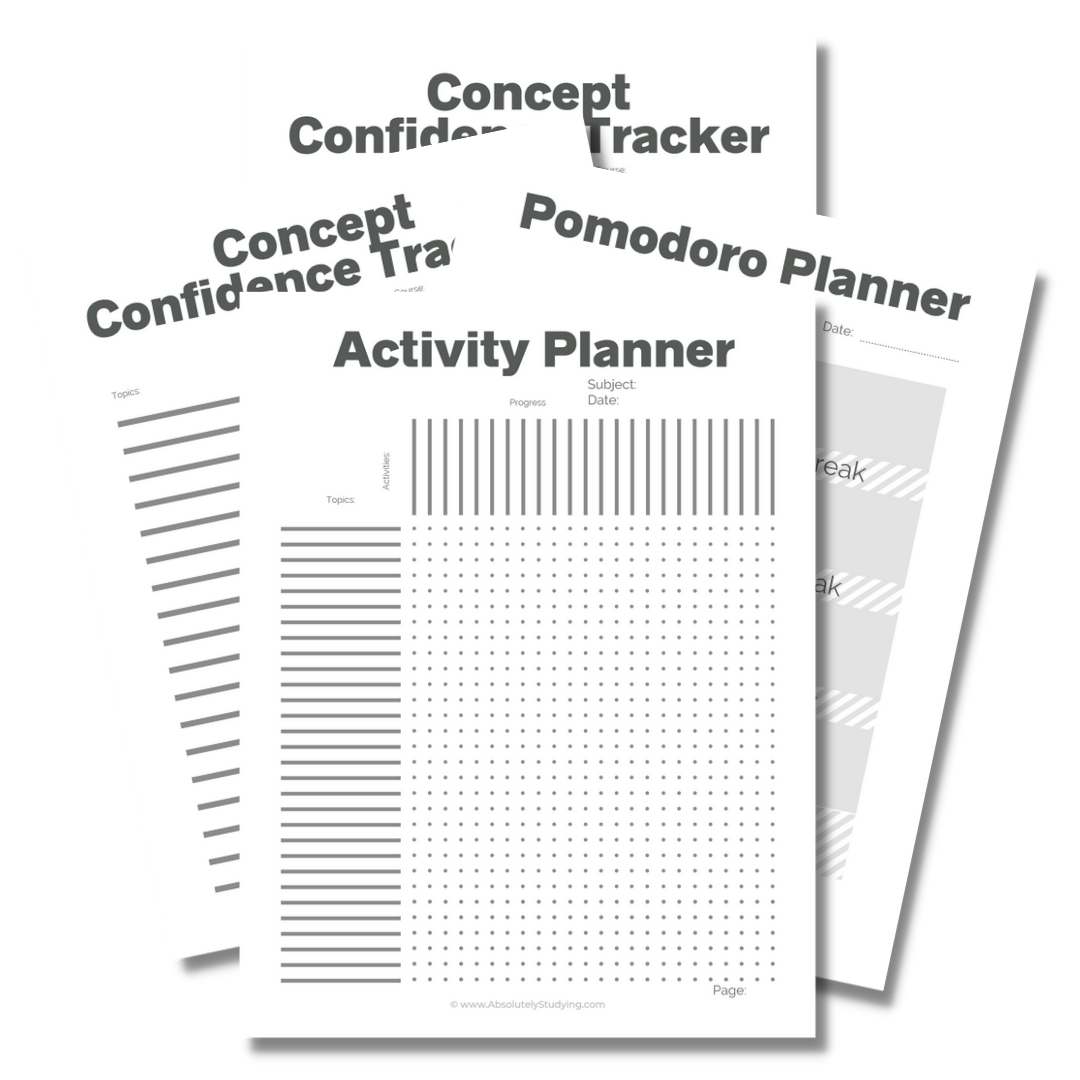10 Last-Minute Study Hacks to Save Your Grade
10 Last-Minute Study Hacks to Save Your Grade
How to Retain More Information—Even When You’re Running Out of Time
Everything you need for the semester you want!
This bundle includes:
The Syllabus Study Planner
The Pomodoro Planner
A Confidence Tracker
A Q&A planner
The “Get Organized Checklist”
and more!
This workbook is full of super useful resources that can be applied to every aspect of your day.
* Disclaimer * Some of the posted links are affiliate programs. By clicking these links, I may receive monetary compensation. This will not alter the price or change the buyer's experience.
The final exam is tomorrow, and you’re staring at a mountain of notes, wondering where the semester went. You try to plow through, but it feels like your brain has turned to Teflon. The information just keeps sliding off.
Does this sound familiar? Don’t panic, I’ve been there. We all have. When the clock just keeps counting down, and you can’t seem to get anything done even though you are trying your best to focus.
In this post, we will discuss some quick fixes to help you make the most of your time. These will help you when you’re scrambling to ace that exam and have to maximize your efforts. While it’s not ideal to cram, these hacks can help you to study effectively when you are anxious, overwhelmed, and have your back against the wall while preparing for exams.
Last-Minute Study Hacks to Save Your Grade
When the clock is ticking and panic starts to set in, it’s time to shift into survival mode. These last-minute study hacks are designed to help you make the most of every remaining minute. Whether you’ve got a quiz in a few hours or a final exam tomorrow morning, there’s still time to boost your retention, organize your thoughts, and show up prepared. The key isn’t to cram everything. It’s to study smarter, not harder.
1. Prioritize Your Tasks
First things first, figure out what you need to tackle. Jot down all your subjects or topics, then rank them by importance. This way, you can focus on the crucial stuff first and make sure you get the essentials down before moving on to the less urgent material.
When doing this, make sure you consult your syllabus or textbook. It is easy to overlook topics that might have been forgotten. There is nothing worse than flipping the page during the exam and being confronted with a question about a concept you have never seen before.
2. Create a Study Schedule
Time management is everything when you’re in a crunch. Break your study sessions into manageable chunks and set specific times for each subject. Use a timer to keep track of your progress and take short, regular breaks to avoid burnout. A solid schedule can make your last-minute study hacks way more productive and less stressful.
Start by blocking off time in your calendar each day leading up to the exam. Next, distribute the topics from your study list throughout the study blocks. Make sure to add a couple of refresher blocks as well. Spaced repetition is the most effective way of retaining information.
3. Use Active Learning Techniques
Get hands-on with your study material. Instead of just reading your notes, try summarizing them in your own words, teaching the concepts to a friend, or creating mind maps. Active learning helps you really get a grip on the material and remember it better.
Information is always retained better when you are doing something with it. Active learning is just that: actively practicing the concepts you’ve learned. When you work with or apply the knowledge, your brain can create more memory cues to apply to a broader array of concepts, ensuring you can answer the tough questions on your exam.
4. Focus on Key Concepts and Summaries
When time is tight, it’s crucial to zero in on the main ideas and key concepts. Use summaries, flashcards, and bullet points to review the most important info. This way, you can grasp the core material quickly and efficiently.
Using your own words, rather than memorizing the textbook, will ensure that you actually understand the material rather than parroting superficial talking points. Summaries, flashcards, and bullet points force you to do this when achieving the level of detail needed to explain a concept thoroughly.
5. Utilize Online Resources
Take advantage of the amazing online resources out there. Websites like Khan Academy, Coursera, and YouTube offer free tutorials and lectures on tons of subjects. Plus, online forums and study groups can give you valuable insights and support from other students.
There are even free lectures from Ivy League schools available on OpenCourseWare. These are invaluable when you have a hard time grasping a concept. They are even better if you have a professor who teaches in a way that you just can’t seem to vibe with.
6. Practice with Past Tests
One of the best ways to prep for exams is by practicing with past tests. It not only gets you familiar with the exam format and question types but also helps you spot any gaps in your knowledge. Try to mimic exam conditions by timing yourself and working in a quiet spot.
If you can’t get your hands on an old exam, create one of your own. Both creating practice problems and answering them are great ways to test your knowledge of a subject. You can even trade with your friends.
7. Use Mnemonic Devices
Mnemonic devices are fantastic for remembering information more easily. Acronyms, rhymes, and visualizations can make complex concepts easier to understand and recall. For example, to memorize the order of the planets in the solar system, use the acronym “My Very Educated Mother Just Served Us Noodles.” As far as last-minute study hacks go, this is probably one of the easiest.
The silliness of the sentence will help you remember it. For added emphasis, you can visualize it as well. Adding layers like this to memorize important details enables you to retain them more effectively. This is invaluable during test time.
8. Stay Hydrated and Nourished
Your brain needs fuel to function at its best. Drink plenty of water and eat healthy meals and snacks to keep your energy up. Avoid too much caffeine and sugary foods, as they can lead to crashes and hurt your concentration.
Try incorporating brain-boosting foods like eggs, nuts, fish, and avocados. When our brain and body have what they need to work optimally, the difference will show.
9. Stay Positive and Manage Stress
A positive mindset can make a huge difference in your study efficiency. Practice stress management techniques like deep breathing, meditation, or light exercise to stay focused and calm. Remember, it’s totally okay to take short breaks to recharge and clear your head.
Positive self-talk can also be incredibly helpful. Tell yourself how well you are doing and acknowledge your improvement with the course material. You can also repeat positive affirmations. Your brain loves flattery and will believe it when you say it.
10. Get Enough Sleep
While it might be tempting to pull an all-nighter, lack of sleep can mess with your brain function and memory retention. Aim for at least 7-8 hours of sleep the night before your exam to ensure you’re well-rested and alert. A good night’s sleep can boost your performance way more than a few extra hours of cramming.
Sometimes, stepping away from the desk can be hard, but you deserve it. You deserve to rest, relax, and even sleep.
Study Skills Digital Course
Learn how to create a stress-free, comprehensive strategy!
Bonus Hack: Master the Art of Studying with the Study Skills Digital Course
Cramming the night before an exam might get you through in a pinch, but let’s be honest—it’s stressful, exhausting, and definitely not the most effective way to retain information. If you’re tired of the last-minute panic, it’s time to level up your last-minute study hack game with the Study Skills Digital Course.
This course is packed with strategies to help you:
Stay organized, so you’re never scrambling at the last minute again
Use scientifically backed study methods (like active recall and spaced repetition) to retain information longer
Beat procrastination and study smarter—not harder
Create study guides that actually work for you
Think of it as your cheat code for stress-free, effective studying. Whether you’re prepping for finals, trying to keep up with coursework, or just want to make studying feel less painful.
Want to finally feel confident in your study routine? Grab the Study Skills Digital Course today and start studying like a pro!
Cramming is never ideal, but sometimes desperate times call for desperate measures. Getting through this rough patch may be rocky, but with the right strategy, you can do it, and these hacks will help you squeeze the most out of every minute.
Need some help getting started? Download my free Study Planner & Activity tracker. This workbook will help you stay organized and ahead of the study game so you won’t be surprised by finals again.
I would like to be transparent so that there are no misunderstandings. As an affiliate, I may earn a small commission from any products linked in this post. This is not a sponsored post, and I was not asked to recommend these products. These are products that I genuinely love and wanted to share with my audience.





